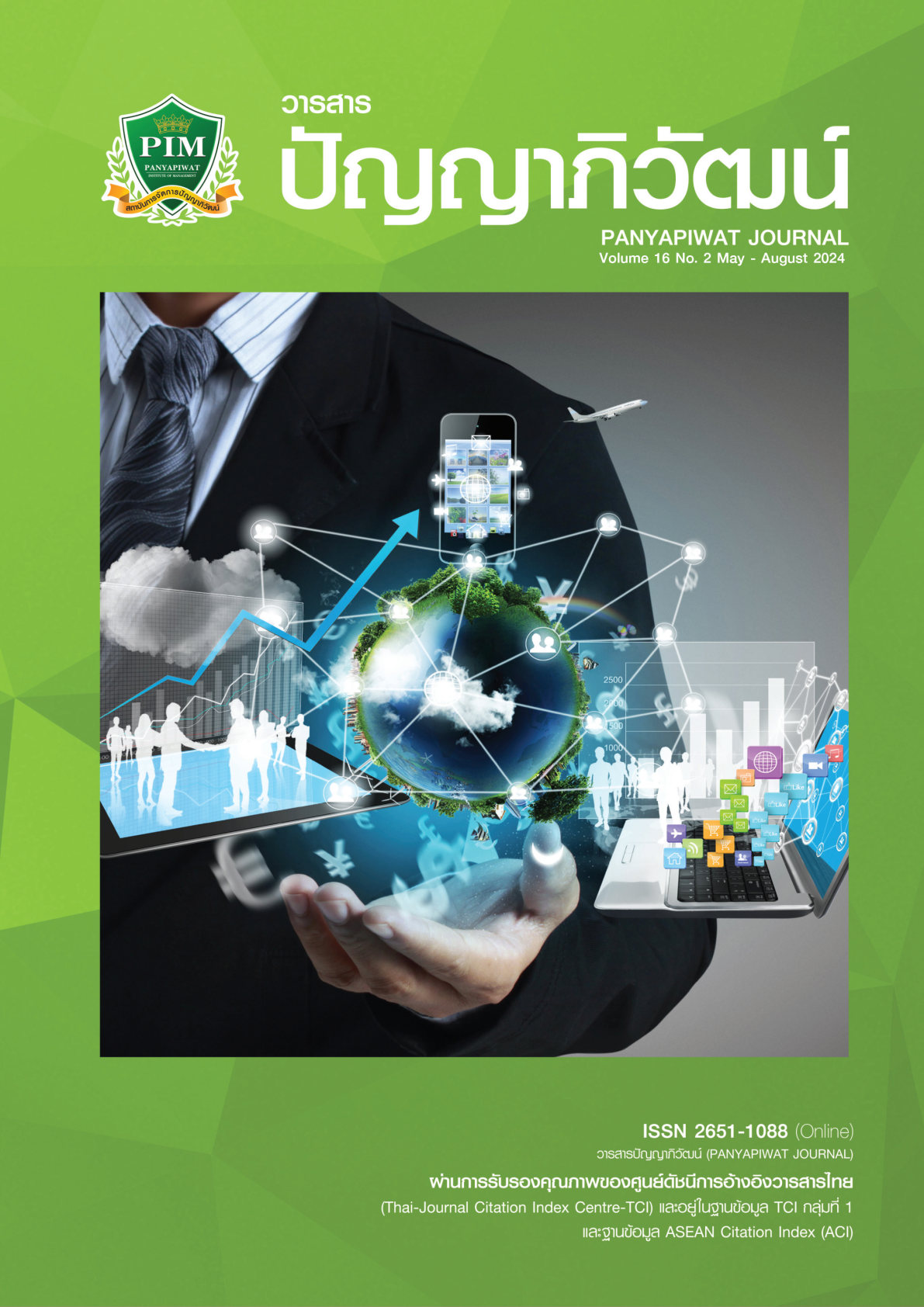INFORMATION ASYMMETRY IN CROSS-BORDER AGRICULTURAL PRODUCT E-COMMERCE: PERSPECTIVE OF POVERTY ALLEVIATION THROUGH E-COMMERCE IN CHINA
Main Article Content
บทคัดย่อ
This study analyzes the performances, factors, and impact of information asymmetry being confronted by producers, platforms, and consumers engaged in cross-border agricultural product e-commerce based on the theoretical research and practical experience of Chinese poverty alleviation through e-commerce. It lays a theoretical foundation for adopting poverty reduction via cross-border agricultural product e-commerce in rural areas and provides feasible suggestions for less-developed regions. By conducting a literature review and interviewing, we discovered the reality, cause, and adverse outcome of asymmetric information dilemma in cross-border agricultural e-commerce. We argue that the risk of information asymmetry generated can weaken the interests of all involving stakeholders and affect the operational efficiency of market. Therefore, the corresponding solutions are proposed to consolidate the outcome of anti-poverty via e-commerce, improve the well-being of agricultural producers, and realize common prosperity
Article Details

อนุญาตภายใต้เงื่อนไข Creative Commons Attribution-NonCommercial-NoDerivatives 4.0 International License.
“ข้าพเจ้าและผู้เขียนร่วม (ถ้ามี) ขอรับรองว่า บทความที่เสนอมานี้ยังไม่เคยได้รับการตีพิมพ์และไม่ได้อยู่ระหว่างกระบวนการพิจารณาลงตีพิมพ์ในวารสารหรือแหล่งเผยแพร่อื่นใด ข้าพเจ้าและผู้เขียนร่วมยอมรับหลักเกณฑ์การพิจารณาต้นฉบับ ทั้งยินยอมให้กองบรรณาธิการมีสิทธิ์พิจารณาและตรวจแก้ต้นฉบับได้ตามที่เห็นสมควร พร้อมนี้ขอมอบลิขสิทธิ์บทความที่ได้รับการตีพิมพ์ให้แก่สถาบันการจัดการปัญญาภิวัฒน์หากมีการฟ้องร้องเรื่องการละเมิดลิขสิทธิ์เกี่ยวกับภาพ กราฟ ข้อความส่วนใดส่วนหนึ่งและ/หรือข้อคิดเห็นที่ปรากฏในบทความข้าพเจ้าและผู้เขียนร่วมยินยอมรับผิดชอบแต่เพียงฝ่ายเดียว”
เอกสารอ้างอิง
AliResearch. (2021). China Taobao Village report 2020. Aliresearch. http://www.aliresearch.com/en/Reports/ReportsdetailsarticleCode=167153834769125376
Carmen, L., Pan, S. L., Sue, N., & Cui, L. (2016). The emergence of self-organizing e-commerce ecosystems in remote villages of China: a tale of digital empowerment for rural development. MIS Quarterly.
Fan, Y. W. (2023). Research on the high-quality development of cross-border e-commerce of agricultural products from the perspective of digital village. Agricultural Economy, (3),135-137.
Gong, L. J. (2016). Research on marketized poverty alleviation mechanism in a context dominated by government: perspective of precise poverty alleviation. China Soft Science, (5), 9.
Guo, J. F. (2019). Research on agricultural brand cultivation: Perspective of targeted poverty alleviation through cross-border e-commerce. Brand Research, (14), 3.
Hu, Z. H., & Peng, K. M. (2021). Research of targeted poverty alleviation through e-commerce in rural area: The perspective of evolutionary game. Mathematics in Practice and Theory, 51(9), 8.
Huang, Y. B. (2021). Dilemma and strategy of information asymmetry in agricultural e-commerce in the new media era. Agricultural Economy, (10), 126-128.
Li, S. X., Wang, T. M., & Wu, Y. P. (2021). Information friction in the digital economy: Insights from information economics. Journal of Beijing Jiaotong University (Social Sciences Edition), 20(4), 11.
Liu, D. M. (2003). The role of market and government in rural anti-poverty in China. China Soft Science, (88), 1-13.
Lu, J. R., & Li, Y. (2019). Evolutionary game of trust between trading parties and e-commerce platform. Journal of Southwest Petroleum University: Social Sciences Edition, 21(1), 7.
Qiu, Z. X., & Zhou, Y. H. (2021). The mechanism of the role of e-commerce in increasing rural household income: An analysis based on a micro empirical test of the interaction between demand and supply. Chinese Rural Economy, (4), 17.
Shi, J. X. (2021). The path and dilemma of poverty-alleviation through e-commerce in rural revitalization. Special Topic on Centennial Party Building, 5, 39-41.
Si, L. J. (2019). The construction of information Poverty alleviation ecosystem and optimization of poverty alleviation path based on digital economy. Library and Information, (2), 9.
Wang, X. D. (2011). The fundamental criterion for assessing the success or failure of rural e-commerce in China. Information China, (3), 3.
Wu, Z. Z. (1997). Information asymmetry theory and its economics significance. Economic Perspectives, (1), 4.
Xiong, X., Zhu, C. X., & Zhu, H. B. (2021). The formation mechanism of consumer trust in e-commerce live streaming of agricultural products: The perspective of intermediary capabilities. Journal of Nanjing Agricultural University (Social Sciences Edition), 21(4), 13.
Xu, R., Liu, Y., Wen, W. J., & Xu, Z. (2014). Research on the potential risk of the internet finance. Financial Regulation Research.
Xu, W. J. (2016). Research on the lemon market of cross-border e-commerce. Industrial & Science Tribune, (10), 2.
Yan, Q., Wang, G. L., & Chen, J. Y. (2018). The path and countermeasure of targeted poverty alleviation through agricultural e-commerce–an example of impoverished area in Guizhou. Rural Economy, (2), 7.
Ye, Y. H., & Gao, Q. (2021). Development and strategies for cross-border e-commerce of agricultural products in China in the post-pandemic era. Practice in Foreign Economic Relations and Trade, (6), 4.
Zhang, C., Ma, B., & Peng, C. (2021). Convergence of labor productivity between agriculture and non-agricultural industries: An important path for common prosperity of rural areas and agricultural producerss. Rural Finance Research, (1), 28-34.
Zhang, X. (2017). Risks of e-commerce information asymmetry and online shopping. Journal of Commercial Economics, (2), 3.
Zhang, X. H. (2018). The path and mechanism of rural e-commerce promoting targeted poverty alleviation. Journal of Beijing University of Technology (Social Sciences Edition), 18(4), 7.
Zhang, X. H. (2022). The Logic of cross-border e-commerce enabling common prosperity. Contemporary Economic Management, 44(3), 4.


